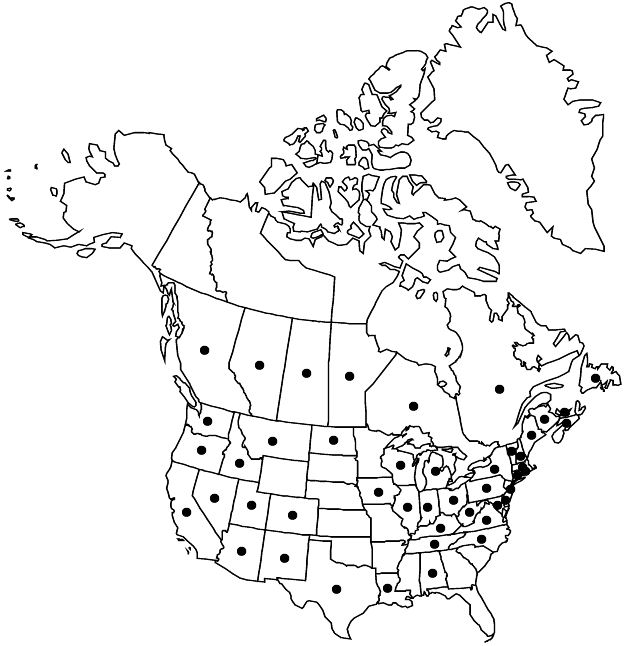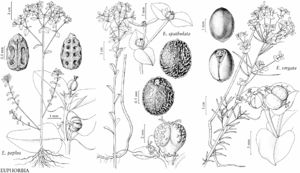Difference between revisions of "Euphorbia peplus"
Sp. Pl. 1: 456. 1753.
FNA>Volume Importer |
imported>Volume Importer |
||
| (2 intermediate revisions by 2 users not shown) | |||
| Line 46: | Line 46: | ||
|elevation=0–1500 m. | |elevation=0–1500 m. | ||
|distribution=Alta.;B.C.;Man.;N.B.;Nfld. and Labr. (Nfld.);N.S.;Ont.;P.E.I.;Que.;Sask.;Ala.;Ariz.;Calif.;Colo.;Conn.;Del.;Idaho;Ill.;Ind.;Iowa;Ky.;La.;Maine;Md.;Mass.;Mich.;Mont.;Nev.;N.H.;N.J.;N.Mex.;N.Y.;N.C.;N.Dak.;Ohio;Oreg.;Pa.;R.I.;Tenn.;Tex.;Utah;Vt.;Va.;Wash.;W.Va.;Wis.;Europe;w Asia;introduced also in Mexico;West Indies;Bermuda;Central America;South America;Africa;Atlantic Islands;Indian Ocean Islands;Pacific Islands;Australia. | |distribution=Alta.;B.C.;Man.;N.B.;Nfld. and Labr. (Nfld.);N.S.;Ont.;P.E.I.;Que.;Sask.;Ala.;Ariz.;Calif.;Colo.;Conn.;Del.;Idaho;Ill.;Ind.;Iowa;Ky.;La.;Maine;Md.;Mass.;Mich.;Mont.;Nev.;N.H.;N.J.;N.Mex.;N.Y.;N.C.;N.Dak.;Ohio;Oreg.;Pa.;R.I.;Tenn.;Tex.;Utah;Vt.;Va.;Wash.;W.Va.;Wis.;Europe;w Asia;introduced also in Mexico;West Indies;Bermuda;Central America;South America;Africa;Atlantic Islands;Indian Ocean Islands;Pacific Islands;Australia. | ||
| + | |introduced=true | ||
|tables= | |tables= | ||
|references= | |references= | ||
| Line 69: | Line 70: | ||
|publication year=1753 | |publication year=1753 | ||
|special status=Weedy;Introduced;Illustrated | |special status=Weedy;Introduced;Illustrated | ||
| − | |source xml=https:// | + | |source xml=https://bitbucket.org/aafc-mbb/fna-data-curation/src/2e0870ddd59836b60bcf96646a41e87ea5a5943a/coarse_grained_fna_xml/V12/V12_27.xml |
|genus=Euphorbia | |genus=Euphorbia | ||
|subgenus=Euphorbia subg. Esula | |subgenus=Euphorbia subg. Esula | ||
Latest revision as of 19:14, 5 November 2020
Herbs, annual, with taproot. Stems erect, unbranched or branched, 5–30 cm, glabrous. Leaves: petiole 1–10 mm; blade obovate, oblong, or suborbiculate, 5–25 × 4–15 mm, base attenuate or cuneate, margins entire, apex obtuse, surfaces glabrous; venation pinnate, midvein prominent. Cyathial arrangement: terminal pleiochasial branches 3–5, usually 2–8 times 2-branched, 1st branching level rarely 3-furcate; pleiochasial bracts similar in shape to and slightly larger than distal leaves; dichasial bracts distinct, ovate to obovate, base obtuse, margins entire, apex obtuse, usually mucronate; axillary cymose branches 0–3. Cyathia: peduncle 0.4–1.1 mm. Involucre cupulate to slightly turbinate, 0.6–1.1 × 0.7–0.9 mm, glabrous; glands 4, elliptic, 0.2–0.3 × 0.5–0.6 mm; horns slightly convergent to divergent, 0.4–0.6 mm. Staminate flowers 10–15. Pistillate flowers: ovary glabrous; styles 0.1–0.2 mm, 2-fid. Capsules subglobose, 1.3–2 × 1.5–2.2 mm, slightly 3-lobed; cocci rounded, with 2 low longitudinal wings, smooth, glabrous; columella 1.1–1.3 mm. Seeds whitish or grayish, subovoid, 1–1.6 × 0.6–1 mm, abaxial faces regularly large-pitted (appearing almost alveolate), adaxial faces longitudinally sulcate; caruncle deciduous, conic, 0.2–0.5 × 0.2–0.7 mm.
Phenology: Flowering and fruiting year-round.
Habitat: Edges of gardens, weedy flower beds, roadsides, waste places, open ground near forests.
Elevation: 0–1500 m.
Distribution

Introduced; Alta., B.C., Man., N.B., Nfld. and Labr. (Nfld.), N.S., Ont., P.E.I., Que., Sask., Ala., Ariz., Calif., Colo., Conn., Del., Idaho, Ill., Ind., Iowa, Ky., La., Maine, Md., Mass., Mich., Mont., Nev., N.H., N.J., N.Mex., N.Y., N.C., N.Dak., Ohio, Oreg., Pa., R.I., Tenn., Tex., Utah, Vt., Va., Wash., W.Va., Wis., Europe, w Asia, introduced also in Mexico, West Indies, Bermuda, Central America, South America, Africa, Atlantic Islands, Indian Ocean Islands, Pacific Islands, Australia.
Discussion
Selected References
None.
